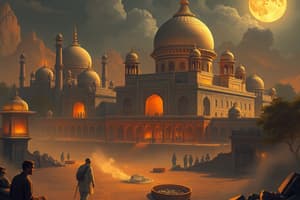Podcast
Questions and Answers
What was the growth rate of per capita income in India between 1925 and 1950?
What was the growth rate of per capita income in India between 1925 and 1950?
What was the per capita income in India in 1947-48?
What was the per capita income in India in 1947-48?
What percentage of the country's working population was engaged in agriculture in 1947-48?
What percentage of the country's working population was engaged in agriculture in 1947-48?
What was the per hectare output of wheat in India in 1947-48?
What was the per hectare output of wheat in India in 1947-48?
Signup and view all the answers
What was the total foodgrain production in India in 1947-48?
What was the total foodgrain production in India in 1947-48?
Signup and view all the answers
What was the contribution of agriculture to GDP in India in 1947-48?
What was the contribution of agriculture to GDP in India in 1947-48?
Signup and view all the answers
What was the primary cause of widespread unemployment in India at the time of independence?
What was the primary cause of widespread unemployment in India at the time of independence?
Signup and view all the answers
What was the approximate power generation capacity in India in 1948?
What was the approximate power generation capacity in India in 1948?
Signup and view all the answers
What was the primary reason for India's dependence on imports?
What was the primary reason for India's dependence on imports?
Signup and view all the answers
What percentage of India's population lived in urban areas in 1948?
What percentage of India's population lived in urban areas in 1948?
Signup and view all the answers
What was the characteristic of India's economy on the eve of independence?
What was the characteristic of India's economy on the eve of independence?
Signup and view all the answers
What was the consequence of the feudalistic mode of production in India?
What was the consequence of the feudalistic mode of production in India?
Signup and view all the answers
What was the consequence of the British government's imposition of heavy taxes on domestic industries in India?
What was the consequence of the British government's imposition of heavy taxes on domestic industries in India?
Signup and view all the answers
What was the purpose of exporting raw materials from India to Britain?
What was the purpose of exporting raw materials from India to Britain?
Signup and view all the answers
What was the outcome of the atrocities committed against Indian artisans?
What was the outcome of the atrocities committed against Indian artisans?
Signup and view all the answers
What was the impact of the British rule on the Indian economy?
What was the impact of the British rule on the Indian economy?
Signup and view all the answers
Why were Indian industries unable to compete with British industries?
Why were Indian industries unable to compete with British industries?
Signup and view all the answers
Study Notes
Features of Indian Economy on the Eve of Independence
- Indian economy was stagnant, with a growth rate of per capita income of 0.5% per annum between 1860-1925 and 0.1% per annum between 1925-1950
- Bulk of the population lived in poverty, with a per capita income of ₹230 in 1947-48
- Standard of living was low, with recurring epidemics and famines
Poverty and Unemployment
- Bulk of the population was very poor, lacking basic necessities like food, clothing, and shelter
- Widespread unemployment was caused by the destruction of handicraft industries
Infrastructure
- Infrastructural development was extremely low, with:
- Power generation capacity of 2,100 MW in 1948
- 53,596 km of railway lines
- 155,000 km of pucca roads
Dependence on Imports
- The country depended heavily on imports for:
- Machinery and production equipment
- Defence equipment
- Consumer goods like sewing machines, medicines, kerosene oil, and bicycles
Urbanization and Rural Poverty
- Only 14% of the population lived in urban areas, while 86% lived in rural areas
- Rural population lacked opportunities outside agriculture, compounding their poverty
Semi-Feudal Economy
- Indian economy was a mixed economy, with a mixture of feudalistic and capitalist modes of production
- Feudalistic mode of production led to low productivity, contributing to backwardness
Colonial Economy
- Indian economy was exploited by the British government for its own benefit
- British government:
- Imposed heavy taxes on domestic industry, forcing Indians to buy British goods
- Used Indian economy as a source of raw material for British industries
- Committed atrocities on Indian artisans to close cottage industries and destroy handicrafts
Studying That Suits You
Use AI to generate personalized quizzes and flashcards to suit your learning preferences.
Description
Test your knowledge of the characteristics of the Indian economy on the eve of independence, including its stagnant growth, and other features. Learn about the growth rate of per capita income and more.



